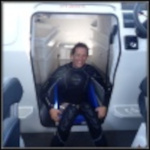

Sandra Erdmann
sandra.erdmann@my.jcu.edu.au
PhD
College of Science and Engineering

Sandra Erdmann
sandra.erdmann@my.jcu.edu.au
PhD
College of Science and Engineering
Genetic diversity and connectivity of Acropora tenuis populations at Magentic Island, Australia
Originally from Germany, Sandra worked as a Research Assistant in several teams at JCU and volunteered at AIMS gaining experience in coral husbandry, ecology and genetics. Currently she is doing her PhD at JCU on Acropora tenuis populations at Magnetic Island investigating their population structure and connectivity with adjacent reefs.
Genetic diversity and connectivity of Acropora tenuis populations at Magentic Island, Australia
2020 to 2024
Project Description
The resilience of coral reef populations to climate change is likely to be positively associated with high genetic diversity, connectivity and thermally tolerant symbionts. Acropora tenuis populations at Magnetic Island are hypothesised to be genetically isolated, which will be tested through the assessment of genetic diversity metrics, connectivity estimates and parentage analyses. Further investigations include the composition and abundance of species belonging to the family Symbiodiniaceae. Restoration trials supplying sexually propagated A. tenuis larvae intend to counteract the predominant coral loss at Magnetic Island; though the success of this method is unknown and will be studied by assessing the survival of coral recruits.
Project Importance
Studying the genetic diversity of Acropora tenuis at Magnetic Island, its connectivity to adjacent reefs and its Symbiodiniaceae community gives further insights into the resilience potential of these populations in regards to a changing climate. Larval reseeding trials can support the growth of these populations, if the success of this method can be confirmed. Thus, the outcomes of this project are important to secure the fitness of coral colonies and their offspring when environmental factors challenge their survival.
Project Methods
About 10 reef sites at Magnetic Island and a selection of inshore and mid-shelf adjacent reefs will be sampled via SCUBA diving and stored in ethanol until DNA extraction. After DNA extraction, genetic analysis will be conducted with NGS genotyping and DArT sequencing using SNP's to analyse and compare genetic diversity, investigate population genetic structure and genetic connectivity of reefs at and with Magnetic Island. Bioinformatic tools will be used to calculate diversity metrics, perform AMOVA and PCA's and estimate connectivity patterns.
Project Results
With the expectation that populations at Magnetic Island show low genetic diversity, their connectivity to adjacent reefs and their Symbiodiniaceae communities might have the potential to provide as source reefs of beneficial genotypes improving their adaptive potential within the region.
Keywords
Biostatistics,
Coral reefs,
Corals,
Ecology,
Field based,
Genetics,
Management tools,
Molecular techniques,
Natural disturbance,
Ocean warming